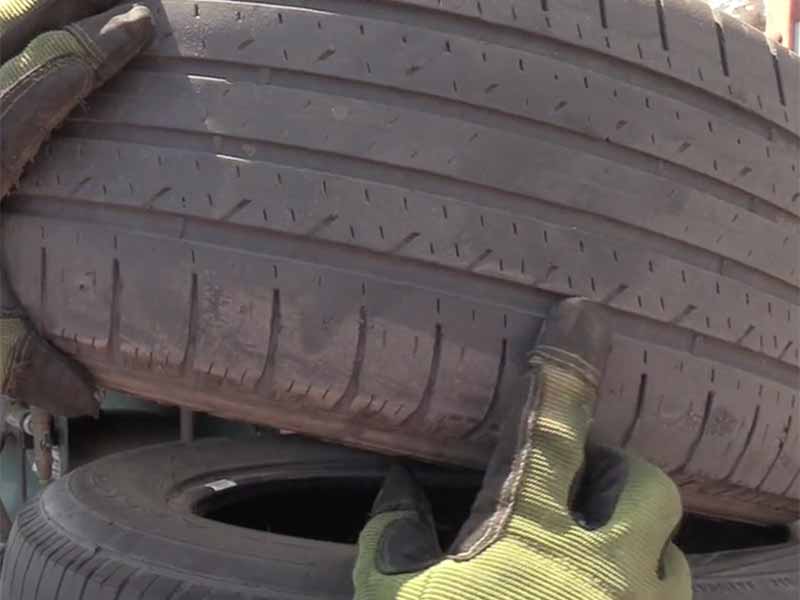Ever noticed your steering wheel suddenly shaking during a drive? It’s unsettling, and understanding why it happens is important understand so you know the urgency and understand the potential solutions.
Steering Wheel Shakes Then Goes Away
When a steering wheel shakes and then stops, it’s typically due to imbalances in the tires, warped brake rotors, or issues within the wheel assembly. Addressing the root cause promptly can prevent more significant vehicle issues down the line.
In this article, we’ll dive deep into the reasons behind intermittent steering wheel vibrations, exploring everything from tire issues to braking concerns, ensuring you’re equipped with the knowledge to tackle and prevent these pesky shakes.
Let’s take a closer look.

Understanding Steering Wheel Vibrations
Navigating the world of steering wheel shakes can be a bit daunting. When you feel that tremor in the wheel, it’s a sign that something might be off. Here, we’ll break down the main causes of these vibrations and their relationship to tires.
What Causes the Steering Wheel to Shake?
The steering wheel connects directly to the wheels of your car. Any discrepancies or issues often manifest through vibrations in the steering wheel.
- Out-of-Balance Tires: This is a frequent cause. When the tire’s weight isn’t evenly spread around the wheel, it can make your steering wheel vibrate.
- Misaligned Wheels: When the wheels are not aligned correctly, they don’t travel straight, leading to noticeable vibrations.
- Worn-Out or Damaged Tires: Tires with damage or significant wear can result in uneven driving experiences.
The Importance of Tires
Tires play a central role in the performance and safety of your vehicle. Ensuring they’re in good shape is critical.
- Tire Pressure: Correct tire pressure is essential. Inconsistent or incorrect air levels in tires can influence how they interact with the road.
- Rotating Tires: Regularly moving your tires to different positions on the vehicle helps in preventing uneven wear.
- Tread Depth: The depth of tire treads impacts traction. As treads wear down, the tire’s performance can be affected, potentially leading to vibrations.
Other Potential Causes
While tires are often the primary cause, several other vehicle components might be responsible:
- Brakes: Issues with brake pads or brake rotors can lead to vibrations in the steering wheel, particularly during braking.
- Suspension Issues: The suspension system helps absorb road impacts. If there are problems with it, vibrations can be felt in the steering wheel.
- Engine Problems: Although less common, certain engine issues can also cause the steering wheel to vibrate.
Simple Checks Before Visiting a Mechanic
Before heading to a professional, consider these basic checks:
- Inspect Your Tires: Look for visible damage, such as punctures or cuts. Also, check if the tire wear seems consistent.
- Check Tire Pressure: Most vehicles have a recommended tire pressure, usually found on a sticker inside the driver’s door or in the vehicle’s manual. Use a tire pressure gauge to ensure they’re at the recommended levels.
Steering Wheel Vibrations: Why They Start and Then Stop
Experiencing your steering wheel start to shake and then suddenly stop can be puzzling. Just when you start worrying, everything goes back to normal. But what causes these transient vibrations? Let’s explore the common reasons.
Out-of-Balance Tires
Tires are meticulously balanced when they’re installed, but over time, due to wear or minor damages, this balance can be offset.
- Speed-Sensitive Vibrations: A slightly imbalanced tire may not cause noticeable vibrations at low speeds. But as you pick up the pace, the centrifugal forces amplify the imbalance, leading to vibrations.
- Self-Correcting Imbalance: Sometimes, as you continue to drive, the imbalance can redistribute due to tire flexing and heat, causing the vibration to lessen or stop.
Warped Brake Rotors
The brake system, specifically the rotors, can also influence steering wheel vibrations.
- Braking-Induced Vibrations: Warped or uneven brake rotors can cause the steering wheel to shake when you apply the brakes. As the pads press against the uneven surface, they transmit this irregularity as a vibration.
- Post-Braking Smoothness: Once you release the brakes and continue driving, the steering wheel stops shaking because the warped rotors are no longer in play.
Wheel and Suspension Issues
The other components of your wheel assembly can also cause transient vibrations:
- Loose Components: Sometimes, components like wheel bearings or suspension parts can become slightly loose, causing vibrations at specific speeds or driving conditions.
- Variable Strains: As you change your speed or driving conditions, the strain on these components changes, sometimes alleviating the vibrations.

Steering Wheel Shakes at Specific Speeds
Ever notice your steering wheel seems to have a favorite speed to start shaking? It’s not just random; the specific speed can tell you a lot about what’s causing it. Let’s dive deeper.
Steering Wheel Shake at 60 mph
This is a common speed for drivers to report vibrations. Here’s why:
- Tire Imbalance: At higher speeds, small imbalances in your tires can become more pronounced.
- Wheel Alignment: Misaligned wheels might not show noticeable signs at lower speeds but can become evident at around 60 mph.
Steering Wheel Shake at High Speeds
When your steering wheel decides to dance only when you’re cruising on the highway, consider the following reasons:
- Aerodynamic Forces: As your vehicle moves faster, it encounters varying aerodynamic pressures, which can sometimes cause vibrations.
- Suspension Issues: At high speeds, any problems with the suspension system can become more evident.
Steering Wheel Shake at Low Speeds
If your steering wheel vibrates right as you start moving, it might be due to:
- Tire Damages: Issues like flat spots or bulges in tires can cause noticeable shakes at low speeds.
- Drivetrain Problems: If there’s a problem in the components that transfer power to the wheels, you might feel it more prominently at slower speeds.
Addressing Speed-Specific Vibrations:
- Regular Tire Checks: Ensure they’re balanced and inspect for any damage or wear.
- Suspension System Inspection: Get it checked for any worn-out parts or damages.
- Wheel Alignment: Ensure your wheels are aligned correctly. It’s a simple fix that can resolve many vibration issues.
- Drivetrain Inspection: Especially if the vibrations are more prominent at low speeds, consider getting your drivetrain inspected.

The Role of Braking in Steering Wheel Shake
Ever noticed your steering wheel shaking a bit more when you step on the brakes? Well, you’re not alone. Braking can indeed amplify or even be the cause of those vibrations. Let’s unravel why this happens and what you can do about it.
Shaking when Braking
When you apply the brakes and feel the steering wheel shaking, here are some potential reasons:
- Worn Brake Pads: Brake pads wear out over time. When they get too thin, they might not function optimally, leading to vibrations.
- Warped Brake Rotors: These are the discs your brake pads clamp down on. If they’re warped or uneven, you’ll likely feel it in the steering wheel when braking.
- Loose Brake Components: Any loose part in the brake system can cause a wobble or shake when you try to stop.
Fixes for Steering Wheel Shake during Braking:
- Replace Brake Pads: If they’re worn down, getting a fresh set can resolve the vibration issue.
- Rotor Resurfacing or Replacement: A mechanic can either smooth out (resurface) the brake rotors or replace them if they’re too worn.
- Brake System Inspection: Have a professional inspect the entire brake system to ensure all components are tight and in good condition.
High-Speed Braking Vibrations
Hitting the brakes at high speeds and feeling the shake? Here’s what might be at play:
- Rotor Issues: At higher speeds, any issues with the brake rotors (like warping) become much more noticeable.
- Brake Caliper Problems: These are the devices that squeeze the brake pads onto the rotors. If they malfunction, you might feel vibrations, especially during high-speed braking.
- Tire Balance and Alignment: Although primarily related to driving speeds, tire issues can also influence braking vibrations at higher speeds.
Fixes for High-Speed Braking Vibrations:
- Rotor Check: Ensure they’re in good condition and consider resurfacing or replacing if necessary.
- Inspect Brake Calipers: If there’s an issue with a caliper, it might need repair or replacement.
- Tire and Wheel Inspection: Ensure tires are balanced and wheels are properly aligned.

Is It Safe to Drive with a Shaking Steering Wheel?
Safety first! That’s the golden rule on the road. If your steering wheel is shaking, you might wonder if it’s safe to continue driving. Let’s explore the potential risks and when you should definitely pull over.
Understanding the Risks
A shaking steering wheel can signal various issues with your vehicle, some more severe than others. Here are the potential risks:
- Reduced Control: Vibrations in the steering wheel can affect your ability to steer accurately, especially at higher speeds.
- Braking Issues: As discussed before, shaking during braking can hint at problems with your brake system, possibly affecting stopping distances.
- Tire Problems: If the cause is tire-related, there’s a risk of tire damage worsening, leading to blowouts or other hazards.
When to Stop Driving Immediately
Certain situations indicate a more immediate problem and warrant pulling over:
- Severe Shaking: If the shaking is intense and hard to control, it’s best to stop and assess the situation.
- Loud Noises: Any unusual sounds accompanying the vibration should be taken seriously.
- Warning Lights: If any dashboard warning lights activate while the steering wheel shakes, that’s your car’s way of saying, “Check me out now!”
Preventative Measures
While no one likes vehicle issues, being proactive can reduce the risk of dealing with a shaking steering wheel:
- Regular Maintenance: Stick to your vehicle’s recommended maintenance schedule. This includes tire rotations, brake inspections, and other essential checks.
- Quick Action: Address minor shakes or vibrations promptly before they escalate into bigger problems.
- Professional Inspection: If in doubt about the cause of the shaking, a mechanic’s expert eye can provide clarity and solutions.

Pulsating Vibrations in the Steering Wheel
Ever felt that rhythmic thud in your steering wheel, like a heartbeat? These pulsating vibrations can be both puzzling and concerning. Let’s delve into what causes them and how to handle them.
What Causes Pulsating Vibrations?
Pulsations in your steering wheel can arise from several sources:
- Warped Brake Rotors: Often, when brake rotors aren’t perfectly flat, they can lead to a pulsing feeling, especially when you apply the brakes.
- Uneven Tire Wear: Tires that have worn down unevenly can result in a rhythmic thud as the uneven spots contact the road.
- Wheel Bearings: These are crucial for smooth wheel movement. Damaged or worn-out bearings might cause pulsating vibrations.
Decoding the Pulse
The nature of the pulsation can offer clues about its origin:
- Consistent and Rapid Pulsations: Typically linked to wheel or tire issues. An uneven tire or a bent wheel could be the culprit.
- Pulsations When Braking: This often points to brake-related issues, especially if the rhythm increases with the speed of the vehicle.
How to Address Pulsating Vibrations:
- Brake System Inspection: As pulsations often relate to the braking system, it’s wise to start by inspecting the brake rotors and pads.
- Tire Examination: Check for uneven wear patterns or damages to the tires. Rotating the tires or replacing them can resolve the pulsation.
- Wheel Bearings Check: If you suspect wheel bearings might be the issue, consider having them inspected and replaced if needed.
Resources
Below are some links you may find helpful when learning about tires
- Why is my steering wheel shaking while driving? – Motor Trend
- Why does my steering wheel shake? – Family Handyman
Final Thoughts
Steering wheel vibrations, especially those that start and then stop, are often more than just a minor annoyance. These shakes can point to deeper issues within your vehicle, from tire imbalances and wear to warped brake rotors or even loose wheel components.
Regular maintenance and prompt attention to these concerns not only ensure a smoother driving experience but also safeguard against more severe vehicle complications in the future.
Good luck and happy motoring.





